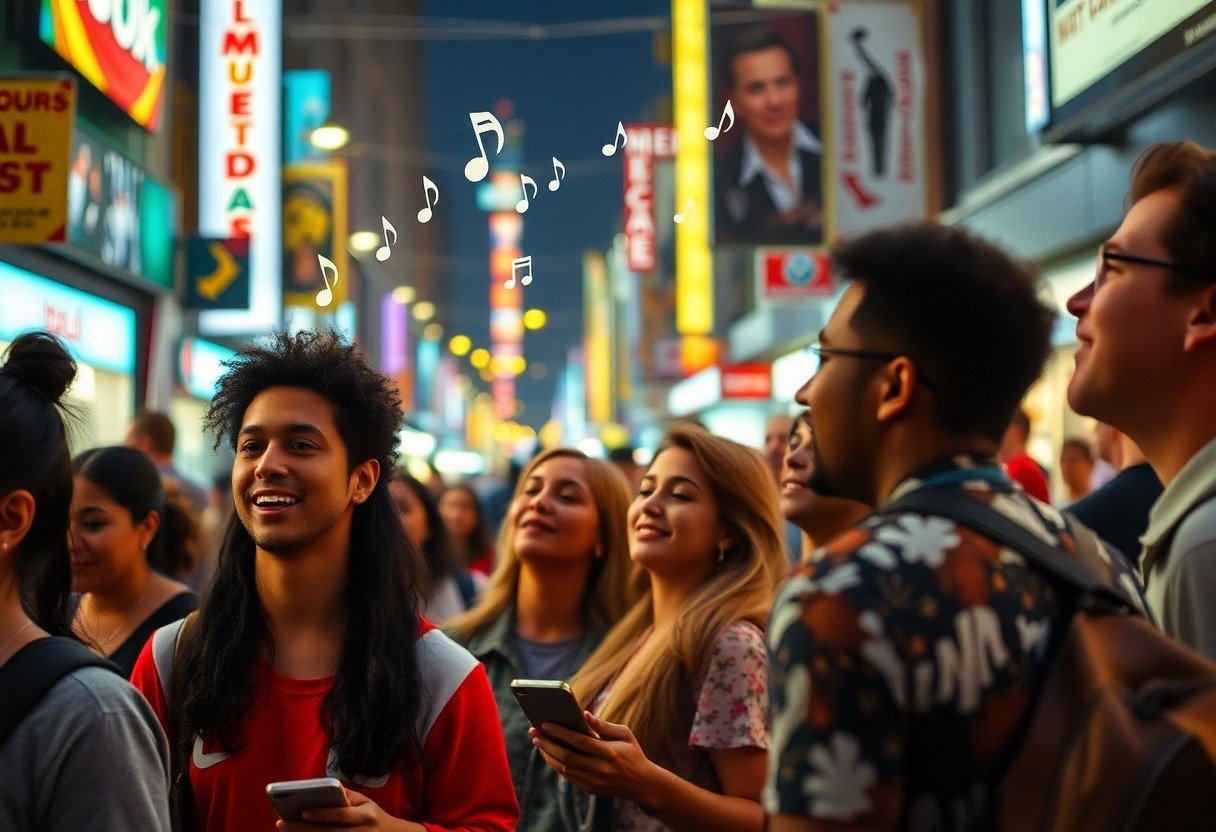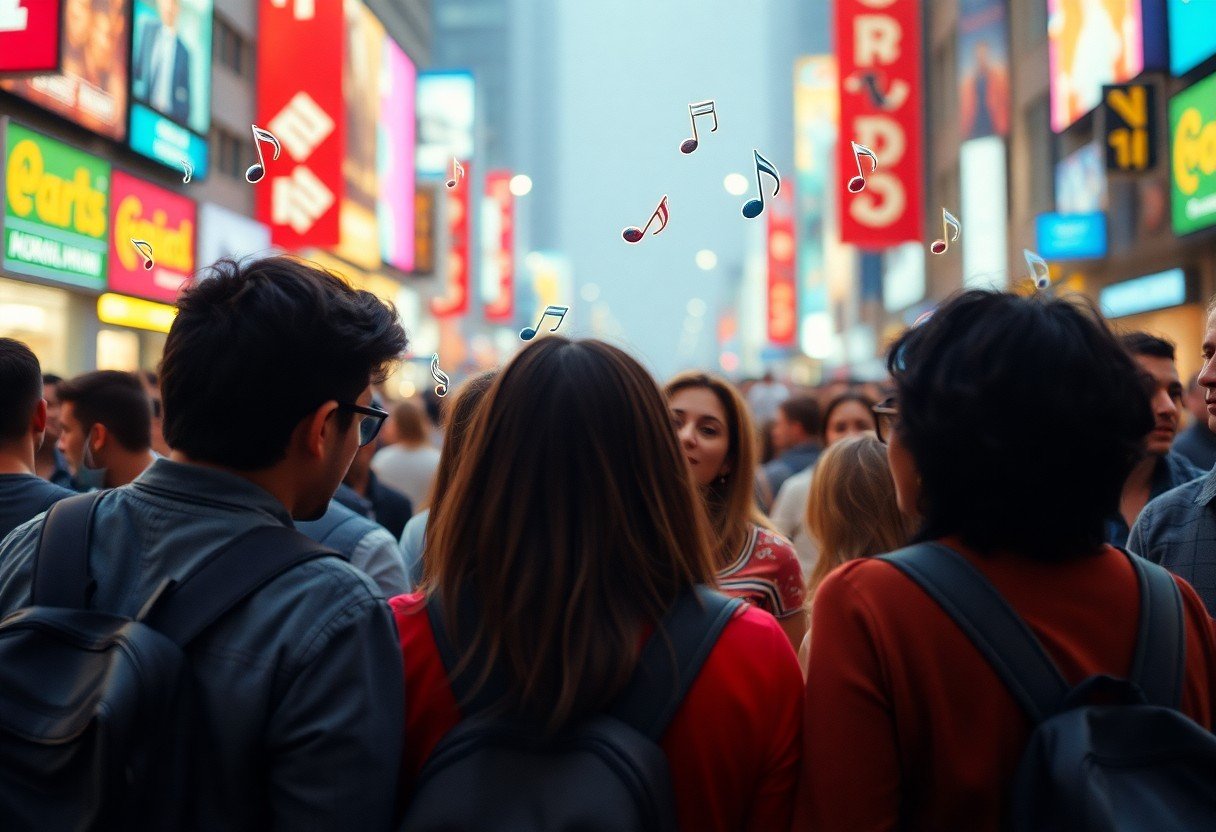Music shapes your perceptions and experiences, influencing the storytelling within your community. From protests to celebrations, each melody carries a message that impacts your societal narratives. It can unite people across diverse backgrounds or spark conflict by challenging existing beliefs. By understanding how music resonates within your culture, you can better grasp its power to motivate change, perpetuate traditions, or even ignite social movements. Discover how these harmonies are not just entertainment, but potent tools for shaping the world around you.
Historical Context of Music in Society
Your understanding of music’s impact on societal narratives is enriched by its historical context. Throughout history, music has served as a vessel for human expression, reflecting prevailing social issues and cultural movements. From the chants of ancient civilizations to the protest songs of the 20th century, music has constantly echoed the sentiments and struggles of its time, shaping not only personal experiences but also collective identities.
Music as a Reflection of Cultural Identity
Cultural identity is often expressed and preserved through music, which serves as a powerful medium for communities to share their stories and values. Traditional folk songs, for example, encapsulate the lore and practices of specific cultures, fostering a sense of belonging and pride among members. In this way, music not only reinforces cultural heritage but also nurtures a shared identity that transcends generations.
The Role of Music in Social Movements
At the heart of many social movements lies the dynamic role of music, which acts as a rallying cry and unifying force. Songs have provided energy and solidarity, galvanizing individuals toward a collective purpose. In the fight for civil rights or against injustice, music transforms personal struggles into communal expressions of resilience and hope.
Considering the impact music has had on social movements, you may recognize its potential to change the course of history. Through songs that highlight issues such as inequality and oppression, individuals have been moved to action, finding strength in shared anthems. Music has often taken on a dual role: a means for protest as well as a source of empowerment. The unifying power of rhythm and lyrics fosters community, encourages participation, and ignites passions, showcasing music’s lasting influence on societal change.

Psychological Effects of Music on Individuals
Now, music profoundly influences your psyche, affecting your mood, cognition, and even physiological responses. Research shows that listening to certain melodies can uplift your disposition or provide comfort during challenging moments. The brain processes music in a unique way, engaging various regions responsible for emotions, memory, and even motor functions. This interplay demonstrates how the right playlist can empower your daily experiences and interactions.
Emotional Resonance and Empathy
Below, you will find that music serves as a powerful medium for fostering emotional resonance and empathy. When you listen to a moving song, it can evoke feelings that resonate with your own life experiences, allowing you to connect with others on a deeper level. This shared emotional journey enhances your ability to understand and empathize with different perspectives.
Music’s Role in Shaping Personal Narratives
The influence of music extends beyond mere entertainment; it actively shapes your personal narrative. The songs you resonate with often become the soundtrack of your life, marking pivotal moments and memories. Each note can remind you of significant relationships, experiences, or emotions, fundamentally altering how you perceive your life story.
Also, the selection of music you engage with becomes integral to your identity, influencing your values and even the decisions you make. Music can guide you through moments of joy, sorrow, or transition, helping you navigate complex feelings and life changes. When you reflect on past experiences, the songs associated with these memories can evoke specific emotions, reinforcing your narrative and shaping who you become. This powerful connection highlights how music not only accompanies your life story but actively participates in its creation and evolution.

Music Genres and Their Societal Implications
If you explore the diverse world of music genres, you’ll uncover how each resonates with specific cultural narratives and societal dynamics. From hip-hop’s roots in resistance to the harmonious tales of folk music, genres embody the zeitgeist of their times, influencing and reflecting the values, struggles, and aspirations of communities. Understanding these connections enhances your appreciation of music as not just entertainment, but as a significant driver of social change.
Folk Music and Tradition
Their narratives often intertwine with local traditions, history, and the collective identity of communities. Folk music captures the essence of cultural heritage, providing a voice for the marginalized and a means to tell untold stories. Through its melodies and lyrics, you can experience the heartbeat of your environment, fostering a sense of belonging and continuity within society.
Contemporary Genres and Social Commentary
Behind the vibrant rhythms and catchy hooks of contemporary music lies a powerful platform for social commentary and activism.
It is within genres like hip-hop, punk, and electronic music that you find artists voicing their opinions on inequality, injustice, and political turmoil. By addressing urgent societal issues, these musicians drive conversations, galvanizing listeners to engage with local and global matters. This interaction reveals the potential of music as a tool for positive change, while also possibly inciting resistance and activism. The impact of contemporary genres on societal narratives serves as a reminder of how your consumption of music can reflect and influence the world around you.
Case Studies: Music and Social Change
Despite the ever-evolving relationship between music and society, it has undeniably served as a powerful vehicle for social change. Here are significant case studies demonstrating this impact:
- The Civil Rights Movement: Songs like “We Shall Overcome” galvanized protests and unity, becoming anthems for equality.
- Anti-Apartheid Movement: “Free Nelson Mandela” by The Special A.K.A. captured international attention, aiding the struggle against apartheid.
- Women’s Rights Movement: Tracks like “I Will Survive” became symbols of empowerment and resilience.
- Environmental Movements: “Big Yellow Taxi” by Joni Mitchell raised awareness about ecological concerns.
The Civil Rights Movement
Against a backdrop of oppression, music emerged as a rallying cry during the Civil Rights Movement. Songs such as “We Shall Overcome” and “This Land is Your Land” were vital in fostering a sense of unity and purpose among activists. These powerful melodies not only highlighted the struggle for racial equality but also mobilized crowds, drawing attention to injustices and inspiring others to join the cause.
Global Music Trends and Activism
Music, functioning across cultures, has increasingly become intertwined with activism in various global contexts. With platforms like social media amplifying impactful messages, artists are now reaching broader audiences than ever before.
Another significant aspect of this phenomenon is the ability of global music trends to unify diverse movements. The rise of artists like Burna Boy and Shakira has transcended borders, utilizing their influence to address issues such as climate change and human rights violations. This demonstrates how music not only entertains but also serves as a catalyst for positive change and global awareness. Through engaging lyrics and collaboration, musicians can raise awareness and inspire collective action, proving that art remains a vital component in shaping societal narratives.
The Influence of Technology on Music and Society
To understand the profound relationship between music and society, you must consider the impact of technology on this dynamic. The advent of Music and Social Justice reshapes narratives, enabling diverse voices to break through traditional barriers. With advancements in recording and distribution, music has become more accessible, allowing individuals to connect and share experiences in unprecedented ways, thereby influencing societal dialogues and cultural shifts.
Digital Platforms and Music Dissemination
An ever-evolving digital landscape has revolutionized how you discover and consume music, transforming artists’ reach and engagement with audiences. Platforms like social media and streaming services allow for instantaneous sharing and discovery, promoting diverse genres and voices that reflect societal complexities. This democratization of music empowers both listeners and creators, fostering a richer, more varied musical tapestry.
The Impact of Streaming on Cultural Narratives
Before streaming services dominated, music consumption was more localized and centralized. The shift to digital platforms has broadened the scope of cultural narratives, enabling underrepresented artists to share their stories globally. This access allows you to explore music from different cultures, enriching your understanding and appreciation of diverse perspectives.
Indeed, the impact of streaming on cultural narratives is multifaceted, as it facilitates the global exchange of ideas while allowing for the rise of niche genres that challenge mainstream trends. On one hand, this democratization promotes inclusivity and diverse storytelling; however, it can also lead to the overshadowing of local talent and commercialization of art. Understanding these dynamics can help you navigate the shifting landscape of music, empowering you to engage with various narratives while promoting positive change in society.
Future Directions: The Evolution of Music’s Impact on Society
After exploring music’s historical significance, you must consider its evolving role in shaping societal narratives. As genres blend and technology advances, your ability to access diverse musical expressions expands, allowing for a richer cultural dialogue. This shift leads to both opportunities for innovation and potential risks of cultural appropriation, raising questions about ownership and authenticity. By engaging with music thoughtfully, you can play an integral part in fostering a more inclusive atmosphere where articulating social issues through sound becomes a powerful tool for change. Embrace this evolution to enhance your understanding of society.









